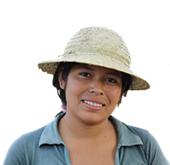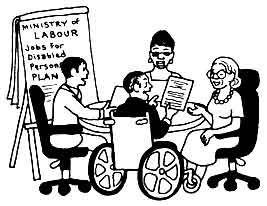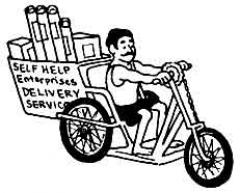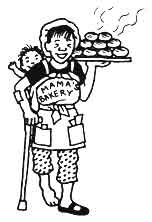Your progress
0%
The activities below represent some strategies your organization can use to support people with disabilities who want to enter into self-employment.
Use your mouse or keyboard to expand each of the activity headings below. To add an activity to your action plan, select the Add button beside it.


Whatever the size and nature of the business proposed, whether individual or group, it is vital to do a proper study of the market. A market analysis has three main elements:
Many people from rural areas, including people with disabilities, often migrate to towns in search of better services and work opportunities.
CBR programmes in both rural and urban areas need to identify self-employment activities that are appropriate to the environment. In rural areas in particular, while options are more limited, the need is to find ways in which people with disabilities can make a contribution to their families’ livelihoods without having to migrate to the town.
For example, many families in rural areas, whether they own land or not, keep animals, such as chickens, pigs, goats, or a house cow. Better animal husbandry is an important way for families to improve their livelihood; and people with disabilities can often take prime responsibility for looking after animals kept at home. CBR can also identify markets for products produced at home.
See how a young Filipino with an intellectual impairment found a way to earn a livelihood that matched his interest and abilities.


Sundy comes from a poor family in Tabaco City, province of Albay, Philippines. Since childhood, he was dependent on his family, especially his mother, because of intellectual impairment.
When Sundy was 10 years old, the CBR programme of the City Government of Tabaco got in touch with him and his life began to change. Thanks to CBR, Sundy’s mother began to understand her son’s disability and what could be done to improve his quality of life. Despite facing many difficulties and discrimination, Sundy completed primary school and then attended San Lorenzo National High School, in the special education unit. During his time at school, Sundy learnt how to cook simple food, how to go to the market, how to use a computer and how to make candles and other handicrafts. But he was bored with studying. When he was 17 years of age, he began to look for an opportunity to earn his own income.
Like any fun-loving teenager, Sundy liked to roam around on a bike and this eventually gave him the idea of how he could earn his own income. He asked his parents to get him a pedicab. Although his parents could not afford to buy one, Sundy succeeded in convincing them to give him one on the condition that he would pay them for it in monthly instalments.
Sundy kept his promise. Through his pedicab, he is able to make a decent income – enough to cover his basic necessities and medication costs and provide some additional household income. His new role influenced the community to change their attitude towards him and he no longer experiences discrimination; instead they encourage him to join in their activities. According to Sundy: “Being an individual with a learning difficulty, it is very important to stand on my own, lead a productive life, have a supportive family and community that accepts my disability without discrimination and of course a bright future”.
The choice of what sort of business activity a person will engage in is the decision of the individual and should be based upon his or her interests, skills and resources. CBR can:
Learn how CBR in Angola helped a young man start a business that matched his interests.


Pedro is a young Angolan man with a disability and a lot of ideas. He was left disabled by polio as a child, but he was bright and good with his hands. Pedro had the idea of building ornamental fish tanks. He makes the tanks well and also sells them well. But to make a bigger tank and get a better market, he needed pumps and filters, which are difficult to find in Angola.
The CBR project team noticed his entrepreneurial spirit and decided to sponsor his participation in the 2008 Huila Exposition for private enterprises and small businesses.
After presenting his product at the Exposition, Pedro made contact with several shops that were willing to get him the pumps and filters he needed, and to sell his tanks. The CBR project team is also providing Pedro with legal advice and funding his participation in a management and accounting training programme. Pedro has pledged that, once his business is up and running, he will also train and recruit other people with disabilities.
Successful entrepreneurs with disabilities exist in many communities. If they are included within the network of CBR they not only inspire other people with disabilities, but can also change the attitudes of a society.

Income-generating activities can provide women with disabilities with a means to supplement their household income. However, women with disabilities often face barriers to their participation in business activities. These may be barriers resulting from:
CBR needs to ensure that extra efforts are made to assist women with disabilities in setting up or expanding income-generating activities, either in the home or in the community, as well as participating in self-help groups and group enterprises.
CBR can support people with disabilities in improving their economic situation by building partnerships with local government departments and community development organizations. Strategies include the following:
No matter what type of self-employment activity is planned, there will be a need for start-up capital. There are four main sources of this capital:
CBR programmes can assist individuals with disabilities to develop resource mobilization skills and access start-up capital.
Learn how a woman who lost her sight was able to improve her life by opening a “chop bar” (restaurant) in Ghana.


Akua is 65 ears old and comes from Borae, Ghana. About 38 years ago, she lost her sight from glaucoma. Her family is said to have a history of blindness as six other family members lost their sight, apparently from the same cause. Akua is married with six children who are now adults, married and living with their own families.
Before becoming blind, Akua was a hairdresser and her husband a trader in foodstuffs. When Akua started losing her sight, she experienced isolation, idleness, discrimination, desertion and misery.
Akua was taken through rehabilitation processes by a local CBR to enable her to reconcile her new life with the past, restore her confidence in managing her life and rebuild her skills so she could re-engage in income-earning activities. Soon after, Akua bounced back into active social life by establishing a local restaurant, or “chop bar”, where she sells kenky (a local staple food made from maize and eaten with fried fish and hot pepper). She was linked to the local credit union to access credit facilities for starting this business.
Every morning, especially on village market days, one can fi nd a steady stream of customers trooping to Akua’s bar for hot kenky and fried fish. Akua is an active contributor to her family and the community.